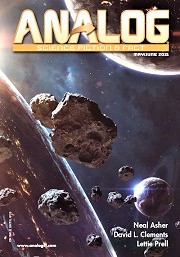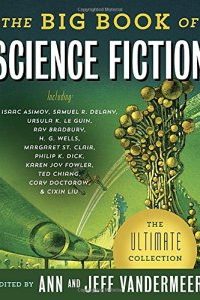Rich Horton Reviews Short Fiction: Asimov’s, Analog, Uncanny, Galaxy’s Edge, and Reckoning
 Asimov’s 5-6/21
Asimov’s 5-6/21
Analog 5-6/21
Uncanny 5/21
Galaxy’s Edge 5-6/21
Reckoning 5
I was particularly excited to see a new story from David Moles – the first I’ve seen in nearly a decade – in the new Asimov’s, and “The Metric” does not disappoint. It’s a far-future story, excitingly inhabiting that subgenre. A billion-year-old ship comes to a planet called Earth, and a city called Septentrion. “It was said that Septentrion was so old that when its first stones were laid, there were still stars in the sky.” For me, that’s sense of wonder! Two young twins – though 100 days apart in age (and Moles subtly layers in the strangeness of this future in many such ways) – named Petal and Piper end up among the first to encounter the ship and its strange denizen. And the denizen has a message: “The world is ending.” The meaning of that message, so far in the future, is more extreme than it might be now, and it concerns “the Metric,” which somehow enables space travel but stresses the fabric of the universe. And – so says this visitor, this messenger – the only proper way forward is to destroy space and time, to make way for a new world. This message is controversial, and it divides the twins… and the story, which then involves the response by the twins and their city to this crisis. It is just cool stuff – one might say Eganesque, but perhaps that is unfair to David Moles, whose imagination is his own and already well proven to play in the same arena Greg Egan plays in.
“Tin Man” by Rick Wilber & Brad Aiken is an enjoyable story about an old pitcher playing semipro (or just amateur) baseball in a future wrecked by political and environmental collapse. Tighe McCann was a promising pitcher for the Detroit Tigers, but a terrible injury led to a rather radical surgical repair to his arm – involving some very high tech and an AI assistant. What we get is a well-handled mix of a baseball story, a medical story, and an oddly optimistic story of post-collapse life.
T.J. Berry‘s “My Heart is at Capacity” is a nicely turned story about an AI designed to be the perfect romantic partner for a human. It’s told by the AI, who is concerned that his heart is at capacity, and he’s not enough for Rebecca – so he wants an upgrade. But, of course, Rebecca’s dissatisfaction is not so easily solved. The story nicely explores the idea of such a relationship, how to compute satisfaction – and, ultimately, what an AI, as opposed to their partner, might deserve in this situation.
The amount of mileage Robert Reed has gotten from his Great Ship concept over the years is as impressive as the mileage the Great Ship manages itself over the millennia. His latest is “Flattering the Flame“, which features one of his recurring characters, Washen, one of the ship’s Captains, as the Ship ponders a flyby of a civilization called the Flame, which occupies only a few worlds and which has a culture built around what is essentially ritual warfare. The other main character besides Washen is Fierce, a warrior of the Flame, who becomes part of their Legion of All, formed with the purpose of conquering the Ship. The story is in the end something of an examination of the usefulness of constant war, though the Ship’s response seems in the end a bit uncomfortably paternalist, or even colonialist (without colonization), and its unlimited, all but magical, powers rob things of tension, to a degree. Still, the story compels attention and thought – Reed is never less than interesting.
Analog features another story about AI, “Uploading Angela” by Lettie Prell. Angela Spelling is a librarian who has just died and is being uploaded to a virtual environment. Something very strange happens, and the protagonist, Jayden, has to take over the uploading process, and work on eliminating what seems to be a computer virus infecting Angela’s upload. All seems normal after this – but it’s not. There are weird discrepancies in the records of Jayden’s work that night, and things still seem off with Angela’s upload. The reader is led down one path, but the resolution heads somewhere different: Should uploaded life be a copy of human life? Or can it be something more, or at least something different?
SF/F stories about fashion are not unheard of, but they aren’t common. A particularly delightful example comes from Fran Wilde in the May/June Uncanny. “Unseelie Brothers, Ltd” makes high end clothes, typically for such things as the Fête Noire Charity Ball. The name of the firm, and some interposed descriptions of their long history of dresses and suits, alerts the reader to the wonder and strangeness of their product, and also to the idea that the costs may be steeper than the purely financial aspect (which is steep enough). Vanessa Saunders is co-chair of the Fête Noire ball this year, and when she learns that Unseelie Brothers has opened a shop nearby, she knows she needs to obtain a dress for her daughter – much as she and her sister got dresses – and, soon, husbands – decades before. But her daughter Rie had half-promised to use a design from her cousin – Vanessa’s late sister’s daughter Sera. Sera is the real protagonist, and even she understands the lure of the Unseelie Brothers, though she is a truly talented young designer herself. The story unfolds beautifully, balancing class issues, fraught family history and secrets, and even labor issues. Sera, raised by a single father after her mother’s disappearance, has had to accept the importunements of her aunt her whole life, in exchange for help with expenses and such. Now, unexpectedly, she is noticed by the Unseelie firm, and given a remarkable opportunity. Like all dealings with them, though, there is a hidden cost. It’s thoughtful fun, with really nice fantastical descriptions of the clothes, and with honest and fair depictions of the characters, and with a practicality-tinged and intelligent conclusion.
Stories about math and mathematicians, rather than stories that display math, are a smallish subset of SF. “Proof by Induction” by José Pablo Iriarte, is about Paulie Gifford, a math professor struggling to get tenure. His tenure hopes had been tied to an ongoing collaboration with his father on a major conjecture, the Perelman Hypothesis, but now his father has died… and Paulie gets an idea. His father’s brain state at the end has been recorded, via a technology called a Coda, with the intention of letting loved ones have one final conversation. But Paulie arranges to keep the Coda, and re-enter it again and again, trying to work with his father on the Perelman. The story asks the right questions: is his father’s Coda really capable of original work? Is Paulie really using this technology properly, or is he reacting more to his issues with his often distant father? Is he making the same mistakes again with his own family, with his wife and daughter?
Finally, Rachel Swirsky‘s “Thirteen of the Secrets in My Purse” is, as the title announces, a list story – and a good one. She riffs beautifully on the possibilities inherent in lipstick, in school photos of people she doesn’t know, in a rebellious passport… and a plane ticket. Nicely executed, and well-concluded.
Galaxy’s Edge has reached an impressive 50th issue. The best story this month comes from C. Stuart Hardwick, “The Snows of Maxwell Montes“. It’s set on what’s becoming a familiar Venus: one in which humans either explore or even colonize the planet from floating platforms in the clouds. This story is told by Oz Landis, who works for a mining operation with his lover Callie (though she might say just “friend with benefits.” They’re investigating a problem at one site, when all of a sudden their own airship is in trouble – it’s being “eaten.” So it’s a “disaster on Venus” story, well-done adventure, with a cool scientific discovery – and an heroic sacrifice – resulting. I thought the ending maybe a bit overdone, but I liked getting there.
The fifth issue of Reckoning, “creative writing on environmental justice,” is, as ever, a stimulating mix of poetry, essays, and fiction, much of the latter SF. Steve Rasnic Tem‘s “Mummies” is a fine character study and depiction of something like a worst-case climate change future, as his aging narrator navigates a somewhat privileged daily life in 130-degree heat in Colorado. In some ways the future depicted in “The Restoration” by Karen Heuler, is even worse, with mass extinctions having occurred, but I was struck by its muted optimism, as a woman named Maria wanders the countryside, urging seeds on the people who remain, in a long-term project to restore the ecosystem, partly by returning humans to a position as part of it, not apart from it; symbolized here by the resistance to a plan to reintroduce dangerous predators.
Recommended Stories
“My Heart is at Capacity”, TJ Berry (Asimov’s 5-6/21)
“The Snows of Maxwell Montes”, C. Stuart Hardwick (Galaxy’s Edge 5-6/21)
“The Restoration”, Karen Heuler (Reckoning 5)
“Proof by Induction”, José Pablo Iriarte (Uncanny 5-6/21)
“The Metric”, David Moles (Asimov’s 5-6/21)
“Uploading Angela”, Lettie Prell (Analog 5-6/21)
“Thirteen of the Secrets in My Purse”, Rachel Swirsky (Uncanny 5-6/21)
“Tin Man”, Rick Wilber & Brad Aiken (Asimov’s 5-6/21)
“Unseelie Brothers, Ltd.”, Fran Wilde (Uncanny 5-6/21)
Rich Horton works for a major aerospace company in St. Louis MO. He has published over a dozen anthologies, including the yearly series The Year’s Best Science Fiction and Fantasy from Prime Books, and he is the Reprint Editor for Lightspeed Magazine. He contributes articles and reviews on SF and SF history to numerous publications.
This review and more like it in the July 2021 issue of Locus.
 While you are here, please take a moment to support Locus with a one-time or recurring donation. We rely on reader donations to keep the magazine and site going, and would like to keep the site paywall free, but WE NEED YOUR FINANCIAL SUPPORT to continue quality coverage of the science fiction and fantasy field.
While you are here, please take a moment to support Locus with a one-time or recurring donation. We rely on reader donations to keep the magazine and site going, and would like to keep the site paywall free, but WE NEED YOUR FINANCIAL SUPPORT to continue quality coverage of the science fiction and fantasy field.
©Locus Magazine. Copyrighted material may not be republished without permission of LSFF.





